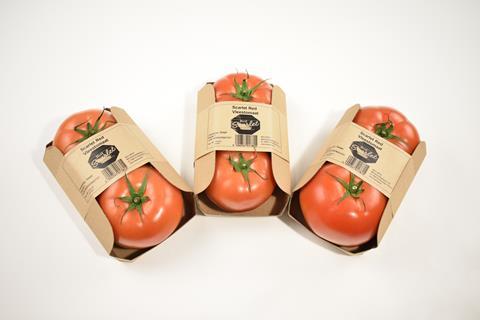From yellow to brown, large and small, loose and on the vine, BelOrta’s tomato range continues to develop, with the Belgian cooperative always on the lookout for new varieties
Tomatoes command a prominent position in BelOrta’s assortment, according to the Belgian cooperative’s Maarten Verhaegen. The company’s extensive range features all the colours and sizes, with the focus remaining firmly on taste and quality over volume.
“250 varieties are evaluated annually,” says Verhaegen. “Knock-out criteria such as appearance, taste and shelf-life are examined, and a variety is only selected if it scores better in every aspect than its current counterpart in the range.”
Beside the classic varieties, BelOrta also markets a range of specialty tomatoes that have a unified and highly recognisable premium concept, with bright colours and contemporary drawings.
Varieties include Sweet Lily, Papritom, Deliziano (a mini-San Marzano on the vine), Ministar, Sweet Bel, Cherrystar, Ruby Red, BelOCoeur (Coeur de Boeuf) and Scarlet Red.
Last year, BelOrta launched its Flavour line, a set of specialty tomatoes differentiated by their colour – red on both the inside and outside – and their excellent taste.
BelOrta offers its tomatoes in a wide range of packaging types, including plastic punnets made from recycled plastic and cardboard trays flowpacked or wrapped in a paper band.

“BelOrta differentiates itself from others by using fresh products daily for its small packs,” says Verhaegen, “which means that our products travel from field to fork in no more than 24 hours, depending on the customer’s mode of transport. Not only does this ensure a longer shelf-life, but the tomatoes are also tastier when they reach the supermarket shelves.”
Rising to the challenge
Covid may have been the most widely publicised issue in recent years, but it is certainly not the only one affecting cooperatives like BelOrta. One of the big challenges facing growers is the search for good seasonal labour.
“Together with the government, BelOrta is seeking to create a framework, with good working conditions for seasonal workers,” says Verhaegen. “In addition to strict social controls by government agencies, the welfare of growers’ staff is also included in BelOrta’s terms and conditions.”
Among international tomato buyers, ToBRFV is also a major worry. “At BelOrta, we can offer security through a large number of affiliated growers,” says Verhaegen. “By ensuring that there are at least two growers for every product, we can deal with potential problems more easily.
“But there is no need to be too pessimistic. If there is one thing to be learned from horticulture’s past, it is that together growers can go through multiple challenges and emerge from them stronger.”



